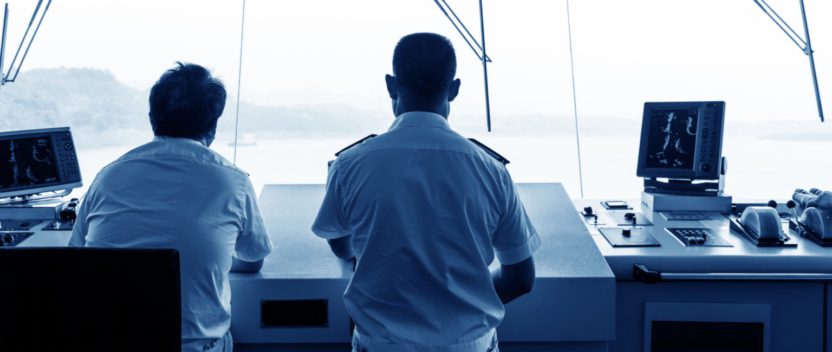Twelve things we learnt this year
It’s been a fascinating year for shipping, in spite, or perhaps because of the poor state of the markets. With the exception of the tanker sector, the industry has wallowed in a combination of poor earnings, high costs and low commodity prices.
As a result the focus on technology, communications and smarter shipping has never been sharper. Over the last 12 months, Great Circle has interviewed thought leaders from across the industry and presented insights that reflect the changes going on and the changes to come. Here are some of the things we learned along the way.
1.) Adopting new practices is a process
Peter Mantel of BMT Smart argued against the perceived wisdom that the incumbent technology of shipping’s noon report works just because it contains a set and reliable amount of data on the ship’s progress.
“It takes nine months of noon reporting to get the same certainty in the data as three months continuous monitoring,” he says. “We need to seriously consider how we continue. Is noon reporting good enough?”
But he also thinks it would be a mistake to suggest that the industry jumps from a virtually manual process to one of continuous digital reporting; “we need a hybrid, semi-automated system so that we can factor in errors and human interaction”.
2.) Leadership needs different voices
The World Ocean Council represents a different voice in shipping; a coalition of like-minded ocean industry companies working proactively to shape and push the agenda to facilitate policy and practice as well as compliance.
“I would say there is value to regulators and the industry in alliances and collaborative organisations that want to get out in front on these issues and develop the agenda in a constructive fashion,” says founder Paul Holthus.
“To have industry develop, test and implement solutions for compliance means progress can be made and we can help shape best practice, policy and regulations to everyone’s benefit. That is what leadership is all about.”
3.) In a world of regulation, enforcement matters
Roger Strevens, Chairman of the Trident Alliance believes that without robust enforcement, non-compliance with regulation will always be a temptation, creating an unacceptable distortion of the competitive environment.
While IMO makes clear the expectations for compliance, policing and enforcement within national waters falls to the relevant coastal state and in international ones, to the ship’s flag state. For the most part shipping will be operating on good faith.
“It’s not just about ports, it’s not just even about territorial waters, it’s all the stages between,” he says. “But if we can’t sort that issue out in the relatively small geographical area of the European ECAs, what chance do we have to get the problem sorted on a global level?”
4.) Authority matters more than hierarchy
“They say ‘officers won’t take orders from people who haven’t sailed as master or chief’, but they will. They do so every day. It all depends what the job description is of the person giving the orders and what the order is about,” says Spinnaker chairman Phil Parry.
If they are to second-guess the Captain, they need to know about being a Captain but Parry says so much of the superintendent’s job as currently defined is not about that.
“There are companies out there who are redefining roles, carving out supporting jobs, separating management from technical responsibilities and creating centres of excellence to house their technically superb former captains and chief engineers. There’s no question that both those with management aptitude and those who really did excel at sea can distribute good advice to their fleet,” he says.
5.) Government policies matter
A Norwegian shipping CEO was asked if he was optimistic about the future, to which he replied that fragmentation and polarisation would be more influential than globalisation. Capital access would be harder to come by and protectionist policies would hamper growth.
Sea-Asia’s global outlook session heard Nordea Bank President Christian Clausen predict that the next three years should be better than last three but he had less good news for borrowers, saying finance would “either be more expensive or unavailable to industries that cannot change their balance sheet structures”.
Klaus Hemmingsen of AP Moller-Maersk agreed that the threat of protectionism is perhaps its biggest risk but, though cautious on world trade growth, said he didn’t see trade embargoes becoming the norm. “Logic will prevail; trade provides for growth, what we need is rational government policies.”
6.) Treat crew like experts not children
“Why not give your chief cook an iPad?” asked Director, Group Strategy, HR & Support for Thome Ship Management. “We give iPads to children. Don’t we want our crews to work smarter?” He was relating the bemused response he received when suggesting to an owner that they give their staff tools that go beyond the essentials of their day to day job function.
ShipServ CEO and Founder Paul Ostergaard added that the need for control and intervention does not mean there should be constraints on initiative.
“We believe that a lot of the intelligence required already exists on the ship but often they lack access to the tools, the data and feedback,” he said. “What we are aiming for is to make that information available in real time to all parts of the supply chain.”
7.) More training is not always the answer
“There’s an implicit assumption in many cases that training is the answer. I have always questioned that assumption,” said Simon Pressly, Group Director, Crew Management for V.Ships. It was a pleasantly surprising statement from a professional of 25 years’ experience, with day to day responsibility for 26,000 crew.
At a time when regulation is growing and the need for improved competence is a mantra, this might go against the grain, but Pressly has no problem with that.
“We have to be very careful about what we mean by training. Are we training for knowledge or actually teaching people how to do things using the tools they have available?” he asks.
8.) Disruption is inevitable
Kate Adamson fears that, faced with disruption, shipping like music and publishing before it, will try to protect its legacy rather than adapting to customer requirements.
“We describe them as disruptive tech companies, but actually technology is only an enabler. The really successful disruptive companies have a relentless focus on creating value primarily for customers. They begin with solving the customer’s problem and work back from there.”
Over the past 15 years, shipping’s return on net assets has been about 3% compared to 9% in the S&P 500 – nowhere near enough to cover the 7% cost of capital. “So in reality what’s destroying value is the status quo.”
9.) Ignore technology risk at your peril
Futurist Gerd Leonhard agreed that shipping must not make the same mistakes as industries which ignored technology risk and barely lived to tell the tale.
One mistake is to continue believing that margins will be maintained and formats unchallenged. Customers are increasingly interested in access, able to do deals and collaborate freely, which leaves the traditional ownership model looking cumbersome and risky.
“It’s normal to reject a new, unfamiliar model for the comfort of the old one, most of the time, it’s just that you haven’t discovered the way for the new model to be valuable enough yet,” he says. “You’re looking at what you used to make and what you’re going to make and you don’t see the opportunities to the left and right of that.”
10.) Smart ships need smarter seafarers
The London International Shipping Week Conference heard that seafarers of the future will need to be better qualified, better educated and able to work in an environment that puts as much emphasis on technology and regulation as it does on ship handling.
Ajit Shenoi, Director of the Southampton Marine and Maritime Institute said the industry of the future will require “people to be trained at different levels of expertise and knowledge, potentially making seafaring safer but also making the job requirement higher and the working conditions better.”
LR’s Tom Boardley poured some cold water on the idea that crew would soon be replaced by unskilled drone ship operators. “You can’t remotely command a ship if you don’t understand the sea.”
11.) Don’t bet that users will pay for bandwidth
Roger Adamson shared the results of the latest Futurenautics survey at DigitalShip Singapore and revealed a huge difference in average regional spend between European and Asian owners.
“In terms of annual investment in IT, around 60% of operators said they were spending $20-60,000 per vessel per year on IT but the difference is Asia. Where European operators spend $28,000, in Asia it’s just $5,000,” he said.
There is a mismatch too between the perceptions of how the connectivity is used. While 80% of crew said connectivity was either a significant or very significant factor in their choice of employer, only 3% of operators said crew welfare was a driver to spending more money on communications.
12.) Data needs regulation
Speakers at the C-SIGMA conference noted a contradiction between the concept of Mare Nostrum and the regulation of surveillance. The use of satellite data is pushing the frontiers of knowledge and is also increasing risk.
When Dutch intelligence supplied data to the US for an attack on a suspected terrorist target in Somalia, they could hardly have imagined they would be sued by relatives of civilians caught in the crossfire.
As one speaker noted, “Securing maritime boundaries, search and rescue or pollution response means the applications will increase exponentially but they are often operated by private companies. Just as with drones, I would ask is the law sufficient to regulate the technology and its applications?”


